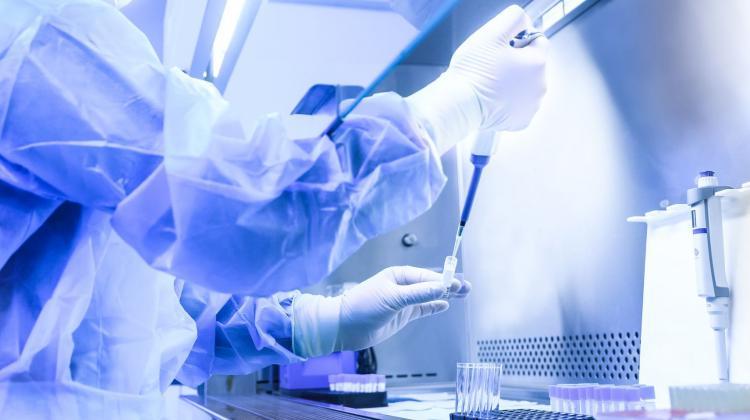Acriflavine may prove effective against SARS-CoV-2 but clinical trials needed to confirm this, says virus expert
 Credit: Fotolia
Credit: Fotolia
A drug used to treat urinary tract infections might also be effective against COVID-19, says a leading Kraków virologist, adding that clinical trials are still needed.
Professor Krzysztof Pyrć from the Małopolska Centre of Biotechnology of the Jagiellonian University together with specialists from the Helmholtz Institute in Munich, last year began looking for a drug that could potentially inhibit SARS-CoV-2 infection.
Professor Pyrć said: “The target was one of the viral proteins called PLpro. It is a multifunctional protein necessary for the coronavirus to multiply, but at the same time it is responsible for turning off our natural cell defence systems.”
The researchers reviewed close to 6,000 drugs approved for use or substances on the path to registration as candidates for further drugs. It turned out that acriflavine could actively inhibit the PLpro enzyme at a very low concentration (several nanograms per millilitre; 1 nanogram is one billionth of a gram).
They also found that this effect was maintained in cell cultures infected with SARS-CoV-2 virus. Effective inhibition was also observed in tissue cultures of the respiratory system and in an animal model. This is a strong signal that this effect can also occur in humans.
Pyrć said: “We have very interesting, but still only scientific information. A molecule that may or may not prove effective in clinical practice.
“We do not know the effectiveness or the correct dosage, and we know that at higher concentrations, acriflavine may have a mutagenic effect.
“Therefore, I strongly advise against using this substance on your own.”
Acriflavine is not approved in Poland for systemic use but is used in some countries such as Brazil in over-the-counter medications for urinary tract infections.
'But even in that country, I wouldn't recommend taking acriflavine against the SARS-CoV-2 coronavirus without any control', he adds.
Stressing that the lotion should not be used at the moment, the virologist said there is a chance to conduct clinical trials and verify that acriflavine actually helps with SARS-CoV-2 infections. Initial talks are being held on with Brazilian companies which could possibly undertake analyses.
Acriflavine at a concentration of ~50nM (several nanograms per millilitre) inhibits the replication of the virus by 50%, it also has a wide specificity for many coronaviruses, such as SARS-CoV-2, MERS-CoV and seasonal viruses.
Acriflavine, discovered over 100 years ago, has been known for a long time and used in various indications, from the treatment of parasitic infections to anti-cancer and anti-HIV-1 drugs. In higher concentrations, due to its antibacterial effect, it is still used as an antiseptic for topical use.
Polish and German specialists are currently working on acriflavine derivatives to reduce the substance toxicity. There is hope that acriflavine will be used in the future to design and develop new, improved active molecules, also against COVID-19. (PAP)
Author: Zbigniew Wojtasiński
zbw/ agt/ kap/
tr. RL
Przed dodaniem komentarza prosimy o zapoznanie z Regulaminem forum serwisu Nauka w Polsce.















